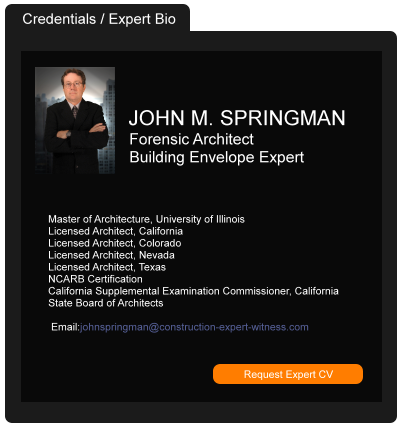Only Two Weeks Until BHA’s Texas MCLE Seminar in San Antonio
April 28, 2014 —
Beverley BevenFlorez-CDJ STAFFThere are just two weeks remaining to sign up for Bert L. Howe & Associate’s inaugural Texas MCLE seminar, “THE RESIDENTIAL CONSTRUCTION PROCESS & CONSTRUCTION DEFECT LITIGATION.” This activity will be presented on Friday, May 9th at noon in BHA’s San Antonio offices, located at 17806 IH 10, Suite 300, San Antonio, TX 78256. There is no cost for attendance at this seminar and lunch will be provided.
This course has been approved for Minimum Continuing Legal Education credit by the State Bar of Texas Committee on MCLE in the amount of 1.0 credit hours, of which 0.0 credit hours will apply to legal ethics/professional responsibility credit. The seminar will be presented by Don MacGregor, general contractor and project manager.
Water intrusion through doors, windows and roofing systems, as well as soil and foundation-related movement, and the resultant damage associated therewith, are the triggering effects for the vast majority of homeowner complaints today and serve as the basis for most residential construction defect litigation. The graphic and animation-supported workshop/lecture activity will focus on the residential construction process from site preparation through occupancy, an examination of associated damages most often encountered when investigating construction defect claims, and the inter-relationships between the developer, general contractor, sub trades and design professionals. Typical plaintiff homeowner/HOA expert allegations will be examined in connection with those building components most frequently associated with construction defect and claims litigation.
The workshop will examine:
* Typical construction materials, and terminology associated with residential construction
* The installation process and sequencing of major construction elements, including interrelationship with other building assemblies
* The parties (subcontractors) typically associated with major construction assemblies and components
* An analysis of exposure/allocation to responsible parties.
Attendance at THE RESIDENTIAL CONSTRUCTION PROCESS & CONSTRUCTION DEFECT LITIGATION seminar will provide the attendee with:
* A greater understanding of the terms and conditions encountered when dealing with common construction defect issues
* A greater understanding of contractual scopes of work encountered when reviewing construction contract documents
* The ability to identify, both quickly and accurately, potentially responsible parties
* An understanding of damages most often associated with construction defects, as well as a greater ability to identify conditions triggering coverage
Course #: 901290467 / Sponsor #: 14152.
To register for the event, please email Don MacGregor at dmac@berthowe.com. If you have any questions, please feel free to contact Don at (210) 540-9017 (office) or (714) 713-4956 (cell).
Read the court decisionRead the full story...Reprinted courtesy of
Colorado Governor Polis’s Executive Order D 2020 101: Keeping Up with Colorado’s Shifting Eviction Landscape during COVID-19
July 27, 2020 —
Luke Mecklenburg - Snell & Wilmer Real Estate Litigation BlogOn March 5, 2020, Colorado Governor Polis issues executive order D 2020 012, which among other things imposed temporary limitations on evictions, foreclosures, and public utility disconnections. After being amended and extended three times (through April 30, 2020 via D 2020-0131, then for an additional 30 days via D 2020 051, and finally for an additional 15 days from May 29, 2020 via D 2020 088), this executive order expired on Saturday, June 13, 2020.
In its stead, the Governor issued a more limited Executive Order—D 2020 101 (the “Order”)—which is effective through July 13, 2020. Most significantly, this current Order requires landlords to “provide tenants with thirty (30) days’ notice of any default for non payment” before they can initiate or file an eviction action (known as an “action for forcible entry and detainer,” or “FED”) and clarifies that tenants shall have the opportunity to cure any default for nonpayment during this period. The current Order also prohibits landlords and lenders “from charging any late fees or penalties for any breach of the terms of a lease or rental agreement due to non-payment” if the fees were incurred between May 1, 2020 and June 13, 2020.
Read the court decisionRead the full story...Reprinted courtesy of
Luke Mecklenburg, Snell & WilmerMr. Mecklenburg may be contacted at
lmecklenburg@swlaw.com
Recording “Un-Neighborly” Documents
April 03, 2019 —
Bob Henry - Snell & Wilmer Real Estate Litigation BlogIn September 2018, in Baumgartner v. Timmins, 245 Ariz. 334, 429 P.3d 567, the Arizona Court of Appeals provided further clarification on what constitutes an “encumbrance” on a property for purposes of Arizona’s statutory scheme prohibiting the recording of “false documents.” The statute, A.R.S. § 33-420, prohibits the recording of documents that a person knows to be forged, are groundless, or that contain material misstatements (or false claims). A person who claims an “interest in, or a lien or encumbrance against” real property who records such documents can be held liable for $5,000 or treble the actual damages caused by the recording (whichever is greater), A.R.S. § 33-420(A), and perhaps even be found guilty of a class 1 misdemeanor, A.R.S. § 33-420(E).
At issue in Baumgartner were neighbors fighting about CC&Rs—a typical neighborhood fight. In 2015, some of the neighbors filed suit against the Timminses for violating the CC&Rs. The Timminses did not contest the lawsuit, resulting in a default judgment. In what the Court of Appeals characterized as a lawsuit filed by the Timminses “in apparent response to the [first] lawsuit and resulting default judgment,” the Timminses created, signed, and recorded affidavits contending that the Plaintiffs in the original lawsuit were themselves “in violation of several provisions of the CC&Rs.” The Plaintiffs then filed suit again against the Timminses, this time contending that the Timminses had violated A.R.S. § 33-420 by recording the affidavits because the affidavits, the Plaintiffs contended, created encumbrances on their properties. The Apache County Superior Court agreed, and issued a final judgment nullifying the recorded documents and awarding the Timminses damages, along with their attorneys’ fees and costs.
Read the court decisionRead the full story...Reprinted courtesy of
Bob Henry, Snell & WilmerMr. Henry may be contacted at
bhenry@swlaw.com
Texas Condo Construction Defect Code Amended
September 17, 2015 —
Beverley BevenFlorez-CDJ STAFFAccording to David H. Fisk of Kane Russell Coleman & Logan PC, “Before filing a lawsuit or initiating an arbitration proceeding pertaining to a construction defect, a condominium association in Texas with eight or more units must now comply with the newly added Section 82.119 to Chapter 82 of the Texas Property Code.”
Fisk reported that the new section “requires affected associations to have a licensed professional engineer inspect the units and common elements in question and prepare a written report that (1) identifies the specific units or common elements, (2) describes the present physical condition of the units or common elements, and (3) describes any modifications, maintenance, or repairs to the units or common elements performed by the unit owners or the association.”
Read the court decisionRead the full story...Reprinted courtesy of
California Bullet Train Clears Federal Environmental Approval
June 30, 2014 —
Michael B. Marois – BloombergThe U.S. Federal Railroad Administration has approved an environmental review needed to begin building a portion of a $68 billion California high-speed rail line that has been mired in lawsuits.
The agency, part of the Transportation Department, said in a release that it cleared a 114-mile (183-kilometer) stretch of the project in the Central Valley.
The California High-Speed Rail Authority has been blocked from selling bonds to begin construction of the first U.S. bullet train until a court decides whether details of the financing were adequately disclosed.
Read the court decisionRead the full story...Reprinted courtesy of
Michael B. Marois, BloombergMr. Marois may be contacted at
mmarois@bloomberg.net
New York Appellate Division Reverses Denial of Landlord’s Additional Insured Tender
December 07, 2020 —
Eric D. Suben - Traub LiebermanIn Wesco Insurance Co. v. Travelers Property & Cas. Co. of America, 2020 WL 6572489 (1st Dep’t Nov. 10, 2020), the New York Appellate Division found that a commercial landlord was owed additional insured coverage in connection with an incident in which a plaintiff slipped and fell on the sidewalk while exiting the leased premises.
The tenant, Capital One, was the named insured in a CGL policy issued by Travelers. The policy added the landlord as an additional insured, but “only with respect to liability arising out of the ownership, maintenance or use of that part of the premises leased to [Capital One] and shown in the Schedule.” The lease defined the demised premises to include the building and “all appurtenances.”
Travelers denied the landlord’s tender on the basis that the sidewalk did not constitute “that part of the premises leased to” Capital One. In the ensuing declaratory judgment action brought by Wesco (the landlord’s insurer), the court granted Travelers’ motion for summary judgment on this ground.
Read the court decisionRead the full story...Reprinted courtesy of
Eric D. Suben, Traub LiebermanMr. Suben may be contacted at
esuben@tlsslaw.com
Musk Backs Off Plan for Tunnel in Tony Los Angelenos' Backyard
December 19, 2018 —
Sarah McBride & Edvard Pettersson - BloombergElon Musk’s futuristic tunneling company, Boring Co., is no longer embroiled in a lawsuit with the residents of West Los Angeles.
A May lawsuit aimed at stopping the Boring Co.’s proposed tunnel under Sepulveda Boulevard has been settled, according to a notice filed at the Superior Court of Los Angeles County. Neighbors in the Brentwood and Sunset Boulevard areas, near the proposed tunnel, had sued the City of Los Angeles over the Boring Co.’s plans to build a test tunnel without going through an environmental review process, as recommended in April by the city’s public works committee.
Read the court decisionRead the full story...Reprinted courtesy of
Sarah McBride & Edvard Pettersson, Bloomberg
The Oregon Tort Claims Act (“OTCA”) Applies When a Duty Arises from Statute or Common Law and is Independent from The Terms of a Specific Contract. (OR)
February 25, 2014 —
Natasha Khachatourians – Scheer & Zehnder LLP Liability NewsletterCase: Jenkins v. Portland Housing Authority, 260 Or.App. 26, 316 P.3d 369 (2013).
Issue: Do tort claims arising from a rental agreement fall within the exemption from the definition of a tort under the OTCA? NO.
Facts: Plaintiff rented an apartment in a public housing complex operated by the Portland Housing Authority (“PHA”). While walking in the hallway of the building, Plaintiff slipped on a puddle of water that had leaked from a broken washing machine in a nearby laundry room. Plaintiff fell and was injured. The trial court granted summary judgment to PHA, finding that the PHA was considered a public body under the OTCA and, as a result, enjoyed discretionary immunity from liability.
The issue before the court was whether the OTCA applied to a claim under the Oregon Residential Landlord Tenant Act (“ORLTA”) since an ORLTA claim generally arises out of a rental agreement. Plaintiff did not plead breach of a specific provision of the rental agreement, and she conceded that she had alleged a breach of a legal duty resulting in injuries. Plaintiff argued, however, that her claim involved a duty arising from the rental agreement. As such, she contended her claim fell within the exception of the definition of a “tort” under OTCA, and thus the OTCA should not apply to give PHA discretionary immunity.
Read the court decisionRead the full story...Reprinted courtesy of
Natasha Khachatourians, Scheer & Zehnder LLP Ms. Khachatourians may be contacted at
natashak@scheerlaw.com


































































